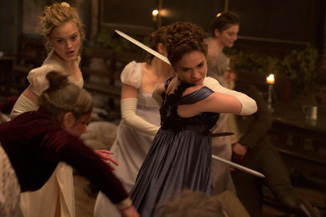Movie Review: Pride and Prejudice and Zombies
By Ben Gruchow
February 11, 2016
BoxOfficeProphets.com

Divorced from the fact that we got the joke long ago, the concept is still amusing; the movie itself isn’t terrible, although the zombie action scenes are the least-compelling parts of the thing. Shot and cut incomprehensibly, mostly in close-up to hide what I suspect was an inadequate amount of weapons and martial-arts training for the participants, the numerous fight scenes take away from the mild enjoyment of seeing Jane Austen’s novel wrinkled and re-shaped to fit the narrative of a zombie apocalypse.
That re-shaping is done pretty well, under the circumstances; the movie is more loyal to Austen’s source material than the Zombies book is, even if the differences are minor. We still spend most of our time with the Bennet sisters, primarily Elizabeth (Lily James) and Jane (Bella Heathcote), as they navigate the ins and outs of their social class. Bingley and Darcy are present, moving into the neighborhood as foils for both of them; Bingley becomes attracted to Jane, while Darcy and Elizabeth more or less fence around each other with mutual dislike that we know will eventually reverse course. Much of what occurs between these people occurs because of perceptions and miscommunications surrounding class expectations and upbringing; Bingley falls for Jane, yes, but Darcy is a status-conscious individual and the Bennets are not highly-regarded within their class.
These are commonalities shared between just about any iteration of Pride and Prejudice; it makes for interesting conflict. The big difference here is that it all takes place against the backdrop of a militarized and walled-off English countryside during the early stages of a zombie apocalypse. No explanation is given for where the zombies came from, which is fine; the horror of a zombie film (and thus the appeal for its crowd) is mostly in the hopelessness of the scenario, not the plausibility or ingenuity of how it’s set up. Here, it adds spiked little points to the end of a lot of Austen’s standard developments; Darcy is concerned primarily with zombie-killing instead of status here, and the book has him separate Bingley and Jane because of his fear that she is one of the undead (the movie restores much of the character’s motivation from the original novel).
Those developments get a whole lot more heavy-handed as the movie goes on; as the movie enters territory where the zombies begin to reveal their own hidden natures and agendas, and as character motivations get more straightforward and explicit within the context of the apocalypse - I haven’t yet touched on the actual concept of the event itself within the film, nor a surprising revelation at a church - I found myself moderately intrigued while missing the sneakiness and darkly comic edge of the first half, where the tilt was on interpreting Austen’s subtext through its zombified characters, rather than explicitly resolving a storyline about them.
Not for nothing does the first real zombie encounter happen outside of a party, at which we’ve spent the preceding 20 minutes watching the Bennets go back and forth about the virtues of pairing off for status and image, and there’s the unmistakable feeling of stratification in the plot line, where the zombies are simply another, lower level of class - a nuisance and spoiler rather than a supernatural threat.
It seems silly, I know, to deconstruct and analyze metaphor and character motivation for this film, but the title is telling: the “and Zombies” bit is an added flourish onto what’s at heart a slick and YA-friendly remake of Pride and Prejudice. It has that look of elaborate chintziness about it that we get from mid-grade, second-string youth-oriented films like The Other Boleyn Girl and Tristan and Isolde: no matter how authentic the locations may be, they still look primarily like underlit sets, and no matter how much period attire you throw onto any of the characters, they still have the unfailingly fresh-faced and well-manicured look of a ready-made CW cast member. Rather than the sense that the cast is inhabiting their characters, we get a sense of shallow imitation. But I’ll say this: as much as it is lacking in conviction and depth, it’s a reasonably faithful retelling of a good story, and it follows each character’s arc accurately, if not altogether effectively.
That first zombie encounter outside the party, by the way, has a nicely gruesome punch line to it for a PG-13 film, one that works literally and on the level of light metaphor. It’s a shame that the action sequence that follows it - and the others that take place throughout the runtime, up to and including the movie’s climactic events - is so paint by numbers in such a hectic and choppy way. There reaches a point where a scene has one cut too many and one camera movement too many, and the events onscreen disappear into sludgy mass of movement that’s almost impossible to parse.
I sat fairly close to the screen in a large-format theater, so the action sequences in Pride and Prejudice and Zombies might pop with a little more clarity from further back, or on a smaller screen. But I don’t think that’s likely the case; I’ve sat about as close to screenings of several large-scale films without the attendant confusion, and I think the culprits here are simply poor framing and editing. It’s not insignificant that this wouldn’t be nearly the issue it is were the movie more focused on its subtext. For that, the movie’s level of intelligence was higher than I expected and higher than it probably needed to be. It’s the third-best film of 2016 I’ve seen thus far; take from that what you will.